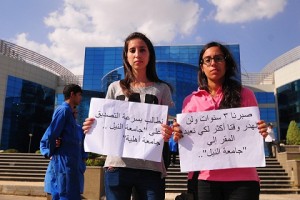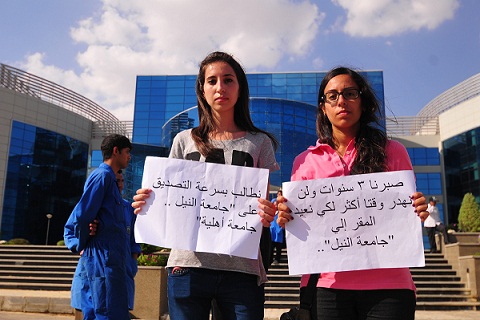
Nile University students rejected the newly formed committee of ex-ministers that is set-up to look into the University’s conflict with Zewail City.
Nile University has been fighting with Zewail City, established by Nobel laureate Ahmed Zewail, for more than two years over a piece of land that both universities claim to be their own.
Nile University students and faculty staff held a press conference on Sunday outside the contested buildings. They criticised the formation of a new committee, questioning whether it can achieve what previous committees have failed to achieve.
On Saturday, Ashraf Hatem, secretary of the Supreme Council of Universities, announced the formation of the committee upon the request of interim Minister of Higher Education Hossam Eissa. The committee members reportedly include, alongside Hatem: former Ministers of Higher Education Amr Ezzat Salama, Moataz Khourhsid and Hussein Khaled.
The committee is tasked with reaching a solution to the conflict between both universities. It is expected to submit a report to Eissa within two weeks.
Eissa told private satellite channel Al-Nahar that the only solution currently available is one that both parties agree on.
There are two contesting verdicts at court, Eissa said. He added that until the Supreme Constitutional Court rules on which of two the verdicts is binding, there is no legal solution.
“It’s impossible for me not to implement a binding verdict, should it exist,” Eissa said.
The Nile University Student Union released a statement on Saturday condemning the new committee’s formation. The union pointed out that another committee was recently formed, comprising of Eissa alongside other ministers, to look into the conflict.
Representatives from both universities met with Eissa and interim Minister of State for Local Development, Adel Labib, and interim Minister of Housing, Ibrahim Mehleb, two weeks ago. At the end of the meeting, most parties except the Zewail City representatives agreed on granting students of the Nile University access to one of the two contested buildings until a final court ruling is issued regarding the matter.
The next day, Zewail City released an official statement saying it had turned down the proposal. Hanan Ezzat, the city’s communication director, said the legal team feared that it would be illegal to give Nile University students the right to use one of the buildings for an unannounced period of time, since the city would be disposing of public property, which it is not authorised to do.
“All the former ministers forming the committee have been unjust to Nile University during their time in the government,” Nile University’s statement read. It questioned the goals of the new committee, given that the decisions of the previous committee were ignored.
Zewail City, meanwhile, welcomed the formation of the new committee. Sherif Fouad, spokesman and media advisor of Zewail City, said: “[Zewail City] welcomes any efforts made by the government to help the students of Nile University,” as long as they are legal and it do not harm Zewail City.
“We are keen on preserving Nile University students’ future,” Fouad added.
The Supreme Administrative Court ruled in April on the dispute, giving Nile University students the right to the disputed lands and buildings.
Zewail filed an appeal to the verdict to the Supreme Constitutional Court, stating that the Giza Court ruled in favour of Zewail City in 2012. He called for stalling the Administrative Court’s decision, since it was appealed and going forward with the Giza court’s decision, because it was not appealed. He also called for a ruling on the two conflicting verdicts.
Since the Supreme Administrative Court’s decision, Nile University students have not yet been granted access to the disputed buildings. Zewail City accepted 300 students into the contested buildings at the beginning of its first academic year on Sunday.




